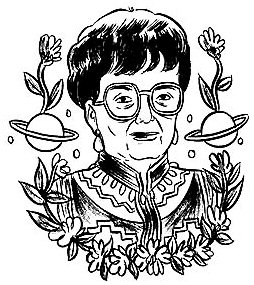The Changeling
by Adrienne Martini 12/28/2005

Andre Norton by David Krall
The clearest sign that the life of genre writer Andre Norton hasn’t gotten the respect it deserves is the fact that many of the millions of people who have read her books probably assume that she was a he. While her contemporaries Robert Heinlein and Isaac Asimov rest in both peace and glory, Norton is little more than a footnote, which is a pity, given how her career pushed through gender boundaries in the field and made it possible for other women to pursue the same course.
Norton’s life lacked the legendary drama of Alice Sheldon’s (writing under the name James Tiptree Jr., Sheldon also broke through science-fiction gender boundaries before killing herself in 1987, just as her work was becoming revered), but nonetheless Norton would not have had the success she did without her pseudonym. In 1934, publishers informed the Cleveland native that her first professional sale—the boys’ adventure story The Prince Commands—would capture a wider audience if it appeared to be written by a man. Alice Mary Norton morphed into Andre and, by the time of her death March 17, at age 93, “Andre” and her other male personas, Allen Weston and Andrew North, had published more than 130 novels and 100 short stories in genres ranging from straight-up science fiction to mysteries to westerns. A fair portion of her work, most notably the 20-plus book Witch World series, was aimed at the young adult reader. Still, a few grownups in the know devoured her tightly plotted fantasies with glee.
Norton was more than a prolific writer. Her career sent echoes through the field. Lois McMaster Bujold, C.J. Cherryh, and Joan D. Vinge all credit Norton as an influence in their respective works and, without Norton’s trailblazing success, many of these women may not have found a receptive editor. Plus former librarian Norton pressed books she liked into the hands of everyone she knew and spread the word about new writers through these recommendations. Indeed, Norton actively fostered the development of a community of genre writers through the anthologies she edited, the collaborations she encouraged, and the letters she wrote, one of which was sent to a young Ursula K. Le Guin shortly after her first novel was published. High Hallack, a writer’s retreat and library that she opened in Murfreesboro, Tenn., in 1999 was a physical monument to Norton’s encouragement of other writers. (High Hallack closed when Norton’s health began its decline.)
For all of this, the Science Fiction and Fantasy Writers of America awarded Norton Grand Master status in 1984, where she joined such luminaries as Heinlein and, later, Asimov. She was the first woman to win this honor. While she has since been joined by Le Guin and Anne McCaffrey, it is easy to speculate that even fewer females would be on the list if it weren’t for Norton’s gumption and encouragement. In 2006, Science Fiction and Fantasy Writers of America will hand out the first Andre Norton Award for young adult fiction. Her last novel, Three Hands for Scorpio, was released in April.


